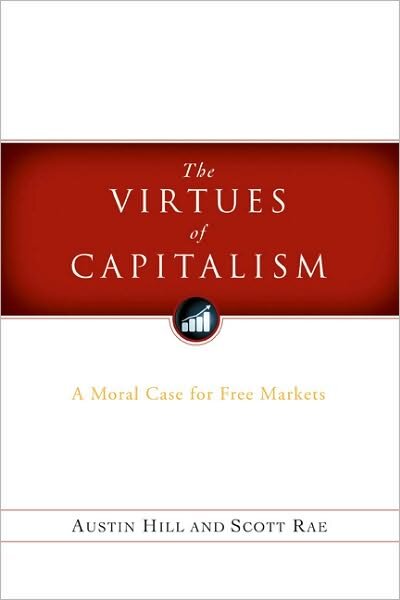Scott Rae and Austin Hill, The Virtues of Capitalism: A Moral Case for Free Markets. Northfield Publishing, 2010.
Referenced in: Christian Perspectives on Economics and Public Policy
LifeandLeadership.com Summary
Engagement in social ministries often thrusts one into matters of economics and public policy, and it is often difficult to find a good balance. For the average church leader, Rae and Hill provide what is perhaps the most readable theological case for capitalism. It is the theological equivalent for the economic case in Jay Richards, Money, Greed, and God. See other resources on the same subject in the Ministry Resource Guide.
In this book, The Virtues of Capitalism, Scott Rae and Austin Hill approach economics as a moral issue. Their thesis is that “despite its flaws, failures, and imperfections, capitalism remains the most moral choice among the world’s economic systems.” They say,
Not only do we believe that it is the preferred choice, we also believe that capitalism is most consistent with a Judeo-Christian view of the world. It also best honors the human person, and is the way in which we can most productively order out lives together. (20)
They support this thesis by first surveying biblical principles that should guide economics and demonstrating capitalism’s consistency with these principles. Next they look at history to see what the world was like before and after capitalism, noting how capitalism historically improves the human condition, contributes to moral virtue and goodness, and requires virtue to sustain itself. This is followed by an honest look at criticisms toward capitalism’s association with greed, materialism, and consumerism. The authors acknowledge the validity of the criticisms but also reveal some of their faulty assumptions. The next chapter addresses the so-called “failure” of capitalism vis-à-vis the “Great Recession” of the twenty-first century, balancing the critics with observations on the impact of larger global financial system and short-sighted governmental intervention. From there, they examine the effectiveness of recent government interventions, arguing that in most cases their attempts to “fix” the problems actually exacerbate them. This is followed by a chapter on the role of genuine greed in bringing down the financial sector, and the tendency of governments to respond with knee jerk control measures that simply make matters worse. The final chapter acknowledges the limits of capitalism, and affirms the important contributions of religious institutions, non-profit groups, and government toward achieving a cohesive society.
Rae is a theologian at Talbot School of Theology, and Hill is a philosopher and cultural commentator. Both are associated with the Acton Institute. Here they apply their skills to the moral issues relative to economics. They defend capitalism, but do so with a keen awareness of its weaknesses. The Virtues of Capitalism provides a refreshing alternative to the gravitation toward socialism found in much of the Christian literature on social justice, and deserve a strong voice among Christian leaders as they consider healthful ways to awaken the church’s social conscience.
From the Publisher
In the aftermath of the recent economic downturn, some observers leveled harsh criticism against free-market economies. In the spring of 2009, for instance, an article in the The London Telegraph insisted that the industrialized West must re-articulate its moral case for market capitalism. Additionally, numerous commentators proclaimed the days of unfettered markets to be over.
In this timely and balanced book, Austin Hill and Scott Rae agree with capitalism’s critics that the economy is essentially a moral issue, but they argue that free markets are by-and-large the solution to financial disasters rather than the cause. Though they recognize that there are legitimate criticisms of the market system — and real limits to what it can and should accomplish — the authors further conclude that capitalism both depends upon and sustains classic Judeo-Christian virtues better than any of its rival systems. Thoughtful and engaging, this book pushes against the tide of current public opinion and some of the administration’s proposed economic policies with a principled defense of capitalism.
About the Authors
SCOTT RAE, Ph.D., is professor of Christian ethics and chair of the philosophy of religion and ethics department at Talbot School of Theology. He’s written six books, including Moral Choices: An Introduction to Ethics and Beyond Integrity: a Judeo-Christian Approach to Business Ethics.
AUSTIN HILL is an emerging American voice on talk radio and in national publications such as U.S. News & World Report and Townhall.Com. Focused on addressing culture-defining questions, Hill has an M.A. in the philosophy of religion and ethics from Biola University.
***For additional information on this resource, including reviews, click the bookstore links. Check the reference at page top or the links below for resource guides on related topics.***
See Other Resource Guides on Christian Social Ministry:
- Theological and Philosophical Foundations of Social Ministry
- Spirituality for Ministry of Social Compassion and Justice
- Strategies For Christian Social Ministry
- Perspectives and Strategies For Social Ministry Among the Urban Poor, Urban Ministry
- Christian Perspectives on Political Theory and Church-State Relations
- Christian Perspectives on Economics and Public Policy
Related Ministry Resource Guides on LifeandLeadership.com:
- Missional Perspectives 03, Missio Dei, Definitions, Contributions
- Missional Perspectives 04, Missio Dei, Observations
- Missional Perspectives 05, Missio Dei, Observations (Continued)
- Missional Church Resources, Introduction and Index
- Theology of Mission
- Missional Communities
- Missional Leadership / Missional Strategies
- Missional Lifestyle, Discipleship, Spirituality
- Church Leadership and Renewal, Index to Resources
- Ecclesiology
- Evangelism
See Resources on Over 100 Ministry Topics:


